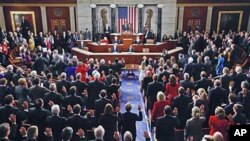The first week of the new year has ushered in political change in the United States, from the halls of Congress in Washington clear across the country to California. Republicans will have a much stronger voice in Congress during the next two years, and several new Republican state governors will have an impact on national politics as well.
The most striking change occurred in Washington where a new Congress was seated and Republicans regained a majority in the House of Representatives after losing it to the Democrats in 2006.
"Welcome to the people's House. Welcome to the 112th Congress," he said.
The new Speaker of the House, Ohio Congressman John Boehner, is promising a return to Republican values with an emphasis on cutting the budget and reducing government regulations.
"The people voted to end business as usual and today we begin to carry out their instructions," said Boehner.
But the changes from the November elections are being felt across the country, especially in several states with new Republican governors.
Scott Walker was sworn in this week as the new governor of the Midwest state of Wisconsin, one of several Republicans who benefitted from the support of conservative Tea Party activists during the 2010 campaign.
"As your governor, I make this pledge. Wisconsin is open for business," Walker said.
Democrats now find themselves as the minority party in the House and have a smaller majority in the Senate. They also hold fewer state governorships following the election.
But there were places where Democrats did well, especially in California, where Jerry Brown has returned as governor, after he was first elected in the 1970's.
"There is no other way forward. In this crisis, we simply have to learn to work together as Californians first, members of a political party second," said Brown.
Congressional Republicans are focused on undoing as much of President Obama's agenda as possible, especially the controversial health-care reform law passed last year with only Democratic support in the Congress.
Saul Anuzis is one of several contenders for the post of chairman of the Republican Party's national committee.
"This is a center-right nation. This is a country that believes in our fundamental conservative principles," said Anuzis. "When we act and talk and work like Republicans, we win. When we start acting and voting like Democrats, we lose."
Democrats say they will look for areas of compromise with Republicans where possible.
Maryland Representative Steny Hoyer is the second-ranking Democrat in the House.
"The American public wants to see progress, not division. They want to see jobs, not simply political rhetoric," Hoyer said.
With Republicans focused on following through on election promises to cut the size of government and many Democrats looking for areas of compromise, experts say that the stage is set for gridlock on a wide range of issues.
John Fortier is a political scholar at the American Enterprise Institute in Washington.
"Overall I am not that hopeful of lots of room for agreement in the next couple of years," Fortier said. "But clearly the president has signaled that he wants to have compromise on some things. [Republican leader] Senator [Mitch] McConnell has also sat down with the president. So there are some things they might want to work on."
If the Republicans and President Obama can find common ground on issues like education reform and free trade, experts say it could help re-position the president as a more centrist leader and improve his chances for re-election in 2012.
New York Daily News Washington Bureau Chief Tom DeFrank is a frequent guest on VOA's Issues in the News program.
"If Obama can show that he can lead with that sort of opposition, I think he will come out stronger," said DeFrank. "I do not buy these stories that he will cruise to re-election, and I think he has got a lot of damage to work out, but I think he stands to benefit if progress is made in governance."
There were also signs of change within the White House this week where presidential press secretary Robert Gibbs announced he will be stepping down early next month. Gibbs is the latest of several senior Obama advisors to announce they are leaving, some of whom are returning to Chicago to prepare for the president's re-election campaign in 2012.
New Year Brings Major Political Change In US




